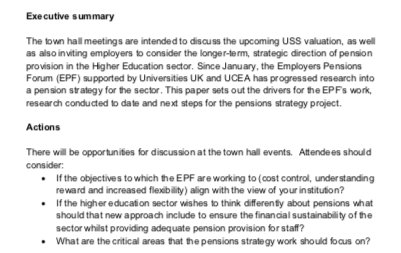So with the publication of the #JEP, the issue of UUK consultations with employer institutions is back big time. Both the famous Sept 2017 survey – and now the possibility, if JEP recommendations are taken up, of UUK reassessing employers' appetite for risk.
I'm worried. 1/
I'm worried. 1/
#JEP has emphasised the problems with how UUK framed the questions. What's really obvious if you look back Sept survey is that all the focus is on risk and on a *reduction to benefits*. And NOT on the potential to increase contributions. Or on amending the technical provisions 2/
You can see the structure of the questions here, in Nottingham's response (one of the institutions that wanted less risk): whatdotheyknow.com/request/440685… 3/
Look in particular at question 7(a):
7.(a) Does your institution prefer maintaining a level of DB accrual for future service at this valuation or moving to a DC-only solution (either temporarily or permanently)?
• Maintaining some DB
• Moving to DC
7.(a) Does your institution prefer maintaining a level of DB accrual for future service at this valuation or moving to a DC-only solution (either temporarily or permanently)?
• Maintaining some DB
• Moving to DC

This UUK survey focus on reductions to benefits is *in spite* of fact that USS, in its Sept consultation on technical provisions, mentions various levers that cd be used – incl. increased contributions: sheffield.ac.uk/polopoly_fs/1.…
So, why did UUK structure their survey that way? 4/
So, why did UUK structure their survey that way? 4/
Because they had already put in hard graft consolidating:
(i) 18% as the maximum employers would be willing to pay
(ii) a move to DC as a reasonable proposal
How?
Well, their framing of questions extends much further back than Sept 2017 5/
(i) 18% as the maximum employers would be willing to pay
(ii) a move to DC as a reasonable proposal
How?
Well, their framing of questions extends much further back than Sept 2017 5/
Autumn 2016 is crucial.
Employers Pensions Forum (UUK and UCEA) run their townhall meetings on HE pensions strategy. Their briefing document mentions seeking "more fundamental benefit reform" as something employers should consider universitiesuk.ac.uk/policy-and-ana…
Employers Pensions Forum (UUK and UCEA) run their townhall meetings on HE pensions strategy. Their briefing document mentions seeking "more fundamental benefit reform" as something employers should consider universitiesuk.ac.uk/policy-and-ana…

And we can now see how this is followed through in UUK's autumn 2016 survey to USS employers.
In the section on benefits, there are two questions whose responses include a move to DC (the screen shots are excerpted from: whatdotheyknow.com/request/505269…) 7/

In the section on benefits, there are two questions whose responses include a move to DC (the screen shots are excerpted from: whatdotheyknow.com/request/505269…) 7/


And, notably, some powerful employers, in responding to that UUK autumn 2016 survey, help to embed:
(i) 18% as the maximum contribution / as their 'red line'
(ii) DC as the way to go 8/
(i) 18% as the maximum contribution / as their 'red line'
(ii) DC as the way to go 8/
Exeter, for example, endorses a move to a DC scheme, stating that it 'regrets that USS has not been able to manage the assets and liabilities of the scheme to enable to continuation of USS as a Defined Benefit Scheme' (whatdotheyknow.com/request/506696… draft submission) 9/
Cambridge says 'anything in excess of 18% is not sustainably affordable' & endorses move of USS to DC-only scheme.
NB This comes from the Pensions Working Group & 'has not been approved by the governing body' prior to submission cc @CambridgeUCU whatdotheyknow.com/request/505286… 10/
NB This comes from the Pensions Working Group & 'has not been approved by the governing body' prior to submission cc @CambridgeUCU whatdotheyknow.com/request/505286… 10/
So, what's my point? I don't think we're remotely out of the woods yet, despite the JEP giving UCU good leverage to continue its fight to protect DB.
Why?
11/
Why?
11/
1. The juggernaut working to convince employers that DB is not sustainable has not been halted. And remember that the JEP Terms of Reference includes UUK/UCU discussions on 'alternative scheme design options'. 12/
2. The magical 18% 'maximum contribution' for employer contributions has been consolidated and embedded over quite some time -- and will continue to drive debates over the valuation, and over maximum employer contributions, not just now but well into he future. 13/
3. We have no guarantee that UUK will do any better, if it ends up reassessing employers' appetite for risk, than previously. Who will design that survey? Will Scheme members have sight of it? How will UUK collate responses? 14/
4. While the JEP tells us that employers' appetite for risk may have shifted since the Sept consultation, there's no evidence (yet) of employers embracing the sustainability of USS DB into the future. ussjep.org.uk/files/2018/09/… (p. 31) 15/ 

The very first #USSbriefs I wrote focused on the drive to undermine/kill off DB – extending back at least to 2014 – amongst UUK and certain employers. medium.com/ussbriefs/the-… #USSbriefs1 16/
That's why we at @USSbriefs and @OpenUPP2018 remain more than vigilant. This is a long-term political & epistemic fight.
The #JEP report helps; of course it does.
But we should not for a minute imagine our work is done. 17/17
The #JEP report helps; of course it does.
But we should not for a minute imagine our work is done. 17/17
• • •
Missing some Tweet in this thread? You can try to
force a refresh





